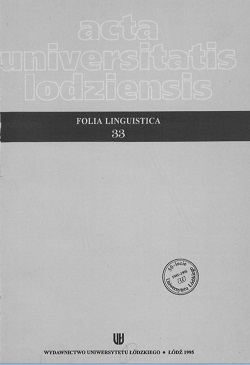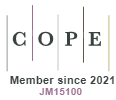Chomsky’s Generative Grammar and Applied Linguistics
DOI:
https://doi.org/10.18778/0208-6077.33.10Abstract
The paper discusses recent developments in the Government-Binding model of generative grammar proposed by N. Chomsky, concentrating on the issue of Universal Grammar. Chomsky asks three questions about the status of knowledge of language: (1) What constitutes knowledge of language? (2) How is knowledge of language acquired? (3) How is knowledge of language put to use?
To know a language is to be in a specific mental state, knowledge of language is acquired through a rich and structured system of innate knowledge. This innate knowledge consists of highly modular systems of principles, which constitute Universal Grammar (UG). Within the Government-Binding framework UG is formalized as the lexicon and three levels of representation. Seven modules (subsystems of principles) are responsible for adequate derivations of well-formed sentences.
UG is responsible for the acquisition of language (LI); however, from the point of second language (L2) acquisition theory it is important to find out to what degree UG operates in the acquisition of L2. Recent inquiries into various phonological, morphological, syntactic and semantic processes suggest that UG may be crucial in L2 acquisition though almost certainly it is not the only mechanism involved.
Further studies dealing with principles and parameters across different languages are required to give a more complete picture of the relationship between UG and L2 acquisition. Results of such studies should be important and illuminating for both the theory of L2 acquisition and for the theory of generative grammar.
The paper provides an overview of recent publications devoted to Chomsky’s theory and discusses some of the more specific issues in the context of applied linguistics.
Downloads
References
Bobrowski, I. 1988, Gramatyka generatywno-transformacyjna (TG ) a uogólniona gramatyka struktur frazowych (GPSG), Wrocław: Ossolineum.
Google Scholar
Bobrowski, I. 1993, Językoznawstwo racjonalne. Z zagadnień teorii językoznawczej i metodologii opisów gramatycznych, Kraków: Polska Akademia Nauk, Instytut Języka Polskiego.
Google Scholar
Bolc, L, Mykowiecka, A. 1992, Wybrane metody formalnego zapisu składni, Warszawa: Akademicka Oficyna Wydawnicza RM.
Google Scholar
Borsley, B. 1991, Syntactic Theory, London: Edward Arnold.
Google Scholar
Broselow, E. 1988, Second Language Acquisition, [w:] F. Newmeyer, (red.), t. 3, s. 194–209.
Google Scholar
DOI: https://doi.org/10.1017/CBO9780511621062.008
Burt, M. 1971, From Deep to Surface Structure, New York: Harper and Row.
Google Scholar
Chomsky, N. 1965, Aspects of the Theory of Syntax, Cambridge, Mass.: MIT Press (polskie tłumaczenie: Zagadnienia teorii składni, tł. I. Jakubczak, Wrocław: Ossolineum, 1982).
Google Scholar
Chomsky, N. 1979, Language and Responsability, Brighton: Harvester Press.
Google Scholar
Chomsky, N. 1980a, Rules and Representations, Oxford: Basil Blackwell.
Google Scholar
DOI: https://doi.org/10.1017/S0140525X00001515
Chomsky, N. 1980b, On Binding, „Linguistic Inquiry” 11, 1–46.
Google Scholar
Chomsky, N. 1981, Lectures on Government and Binding, Dordrecht: Foris.
Google Scholar
Chomsky, N. 1982, Some Concepts and Consequences of the Theory of Government and Binding, Cambridge, Mass.: МIT Press.
Google Scholar
Chomsky, N. 1986a, Knowledge of Language: Its Nature, Origin and Use, New York: Praeger.
Google Scholar
Chomsky, N. 1986b, Barriers, Cambridge, Mass.: MIT Press.
Google Scholar
Chomsky, N. 1988, Language and Problems of Knowledge: The Managua Lectures, Cambridge, Mass.: M IT Press.
Google Scholar
Chomsky, N. 1989, Some Notes on Economy of Derivation and Representation, „MIT Working Papers in Linguistics” 10, 43-74.
Google Scholar
Chomsky, N. 1993, A Minimalist Program for Linguistic Theory, [w:] K. Hale, S. J. Keyser (red.), The View from Builiding 20: Essays in Linguistics in Honour of Sylvain Bromberger, Cambridge, Mass.: MIT, Press.
Google Scholar
Chomsky, N. 1994, Bare Phrase Structure, „MIT Occasional Papers in Linguistics" 5, April.
Google Scholar
Cook, V. J. 1988, Chomsky's Universal Grammar, Oxford: Basil Blackwell.
Google Scholar
Dakowska, M. 1995, Models of Language Use and Language Learning in the Theory of Language Didactics, Warszawa: Wydawnictwa UW.
Google Scholar
Dobryjanowicz, E. 1992, Wybrane metody analizy składniowej, Warszawa: Akademicka Oficyna Wydawnicza RM.
Google Scholar
Felix, S. 1987, Cognition and Language Growth, Dordrecht: Foris.
Google Scholar
DOI: https://doi.org/10.1515/9783110871678
Flynn, S. 1988, Second Language Acquisition and Grammatical Theory, [w:] F. Newmeyer (red.), t. 2, s. 53–73.
Google Scholar
DOI: https://doi.org/10.1017/CBO9780511621055.005
Frege, G. 1977, Funkcja i pojęcie (1891), [w:] Pisma semantyczne, U. B. Wolniewicz, Warszawa: PWN, s. 18–44.
Google Scholar
Freidin, R. (red.) 1991, Principles and Parameters in Comparative Grammar, Cambridge, Mass.: MIT Press.
Google Scholar
Freidin, R. 1992, Foundations of Generative Syntax, Cambridge, Mass.: MIT Press.
Google Scholar
Gussmann, E. 1995, Licensing in Syntax and Phonology, PASE Studies and Monographs, vol. 1, Lublin: Wydawnictwo Folium.
Google Scholar
Haegeman, L. 1991, Introduction to Government and Binding, Oxford: Basil Blackwell.
Google Scholar
Hyams, N. 1986, Language Acquisition and the Theory of Parameters, Dordrecht: Reidel.
Google Scholar
DOI: https://doi.org/10.1007/978-94-009-4638-5
Jackendoff, R. 1987, The Status of Thematic Relations in Linguistic Theory, „Linguistic Inquiry” 18, 369–411.
Google Scholar
Kardela, H. 1983, A Note on the pro-drop Parameter, „Lubelskie Materiały Neofilologiczne” , 255–261.
Google Scholar
Kardela, H. 1985, A Grammar of English and Polish Reflexives, Lublin: UMCS.
Google Scholar
Kardela, H. 1986, Wh-movement in English and Polish. Theoretical Implications, Lublin: UMCS.
Google Scholar
Kardela, H., Muszyński , Z. (red.), 1991, Noam Chomsky: Inspiracje i Perspektywy, Warszawa: Biblioteka Myśli Semiotycznej.
Google Scholar
Kasher, A. (red.) 1991, The Chomskyan Turn, Oxford: Basil Blackwell.
Google Scholar
Kean, M.-L., 1986, Core Issues in Transfer, (w:] E. Kellerman, M. Sharwood Smith (red.), s. 80–90.
Google Scholar
Kellerman, E., Sharwood Smith , M. (red.) 1986, Crosslinguistic Influence in Second language Acquisition, Oxford: Pergamon Press.
Google Scholar
Kurcz, I. 1992, Język, [w:] T. Tomaszewski (red.), s. 171–267.
Google Scholar
Lasnik, H., Uriagereka , J. 1988, A Course in GB Syntax, Cambridge, Mass.: MIT Press.
Google Scholar
Lightfoot, D. 1991, How to Set Parameters. Arguments from Language Change, Cambridge, Mass.: MIT Press.
Google Scholar
Mykowiecka, A. 1992, Metody generowania tekstów, Warszawa: Akademicka Oficyna Wydawnicza RM.
Google Scholar
Newmeyer, F. (red.), 1988, Linguistics: The Cambridge Survey, t. 1–4, Cambridge: Cambridge University Press.
Google Scholar
DOI: https://doi.org/10.1017/CBO9780511621055.002
Ouhalla, J. 1994, Transformational Grammar, London: Edward Arnold.
Google Scholar
Pinker, S. 1989, Learnability and Cognition: The Acquisition of Argument Structure, Cambridge, Mass.: MIT Press.
Google Scholar
Pollock, J.-Y. 1989, Verb Movement, Universal Grammar, and the Study of IP, „Linguistic Inguiry” 20, 365–424.
Google Scholar
Radford, A. 1990, Syntactic Theory and the Acquisition of English Syntax, Oxford: Basil Blackwell.
Google Scholar
van Riemsdijk, H., Williams , E. 1986, Introduction to the Theory of Grammar, Cambridge, Mass.: MIT Press.
Google Scholar
Rizzi, L. 1982, Issues in Italian Syntax, Dordrecht: Foris.
Google Scholar
DOI: https://doi.org/10.1515/9783110883718
Rizzi, L. 1986, Null Objects in Italian and the Theory of pro, „Linguistic Inquiry" 17, 467–558.
Google Scholar
Romaine, S. 1988, Pidgin and Creole Languages, London: Longman.
Google Scholar
Rozwadowska, В. 1992, Thematic Constraints on Selected Constructions in English and Polish, Wrocław: Wydawnictwo Uniwersytetu Wrocławskiego.
Google Scholar
Schachter, J. 1988, Second Language Acquisition and its Relationship to Universal Grammar, „Applied Linguistics" 9, 219–235.
Google Scholar
DOI: https://doi.org/10.1093/applin/9.3.219
Stalmaszczyk, P. 1991, Gramatyka uniwersalna Chomsky'ego – najnowsze tendencje i niektóre implikacje, [w:] H. Kardela , Z. Muszyński (red.), s. 139–156.
Google Scholar
Stalmaszczyk, P. 1992, The Structure of Thematic Relations in English, Łódź: EKORNO .
Google Scholar
Tomaszewski, T. (red.) 1992, Psychologia ogólna, t. 3, Warszawa: Wydawnictwo Naukowe PWN.
Google Scholar
White, L. 1985, The pro-drop Parameter in Adult Second Language Acquisition, „Language Learning” 35, 47–62.
Google Scholar
DOI: https://doi.org/10.1111/j.1467-1770.1985.tb01014.x
White, L. 1989, Universal Grammar and Second language Acquisition, Amsterdam: John Benjamins.
Google Scholar
DOI: https://doi.org/10.1075/lald.1
Willim, E. 1989, On Word Order: A Government-Binding Study of English and Polish, Kraków: UJ.
Google Scholar
Zabrocki, W. 1990, Czy język jest wrodzony? Językoznawstwo Chomsky'ego a hipoteza natywizmu, Poznań: Wydawnictwa UAM.
Google Scholar
Downloads
Published
How to Cite
Issue
Section
License

This work is licensed under a Creative Commons Attribution-NonCommercial-NoDerivatives 4.0 International License.










